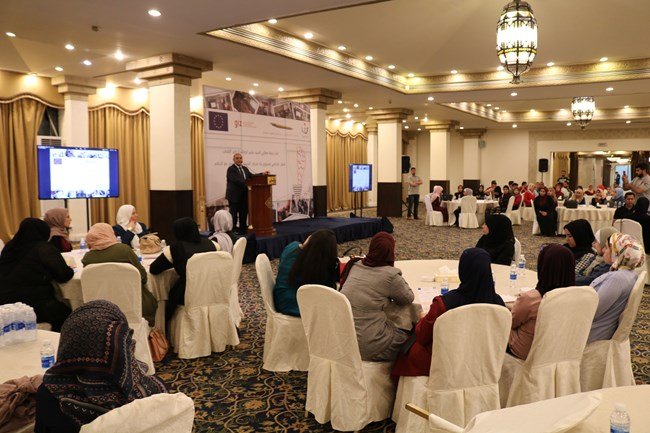
Amman – Jordan Media Institute (JMI), in collaboration with the Ministry of Youth and GIZ, held the closing ceremony of the "Project on Capacity Building of Youth in Dealing With Media-Media Literacy," which is supported by the EU.
The ceremony was patronized by Minister of Youth Bashir Rawashdeh. It was attended by journalists and around 100 young people from the various youth centers in the Kingdom. An Iftar banquet was held during the ceremony.
JMI implemented 22 training programs at 22 youth centers affiliated with the Ministry of Youth in the 12 governorates of the Kingdom. The aim was to train around 440 young men and women aged 16-25 on understanding contemporary communication and media and eradicating news and digital illiteracy.
Minister of Youth Bashir Rawashdeh commended the project and its goals, which enabled many young men and women to improve their skill of dealing with media outlets. He indicated that collaborative work with the JMI led to a good product through good and specialized training and also dealing with the media correctly, especially in light of the media openness we are experiencing. He said that the ministry places all youth centers at the disposal of the JMI to strengthen media literacy and ways to deal with the media.
He added: "It is time to eliminate traditional programs and move toward wider spaces because today's generation has more knowledge of the means of the technological and digital revolution to contribute to the making of young leaders who can achieve the hopes and ambitions of the country and its leadership."
JMI Dean Dr. Basim Tweissi said that "the program is an attempt to disseminate the culture of media and information literacy amid Jordanian youthful communities. It is the first of its kind to be implemented in the governorates." He indicated that "it has achieved a series of successes in all the governorates. This will prompt us to build on this rich experience."
Dr. Tweissi said that "media and information literacy means enabling youth and new generations to positively deal with the media and sources of information, avoid harmful media content, and contribute positively to the production of media content that expresses their priorities and identity."
He said that the JMI is committed to "working with national institutions to support efforts to improve the performance of communication and media channels and to serve national development efforts to contribute to social and cultural change, which is supposed to lead to positive economic change."
Mohammed Freihat from the Kafranjeh Youth Center delivered a speech on behalf of the participants in the training, in which he praised the content of the training courses and the information they contained. He noted that the workshop had a critical and analytical nature and contained many examples that strengthened the discussions and concepts of media literacy and how to deal with news and pictures.
A discussion was held on the sidelines of the ceremony, with the participation of trainers and trainees, in which they praised the course and the training program. They asked for holding more workshops and courses that serve the local communities that are far from governorate centers. Also, two videos produced by the JMI were shown. They highlight the stages of the project and the goals and achievements, as well as the importance of media literacy in our life.
At the end of the ceremony, JMI Dean Dr. Basim Tweissi handed Minister of Youth Bashir Rawashdeh copies of the training manuals developed by the JMI during the project. These include a manual on understanding contemporary communication and media, a manual on news literacy, and a manual on digital media literacy.



